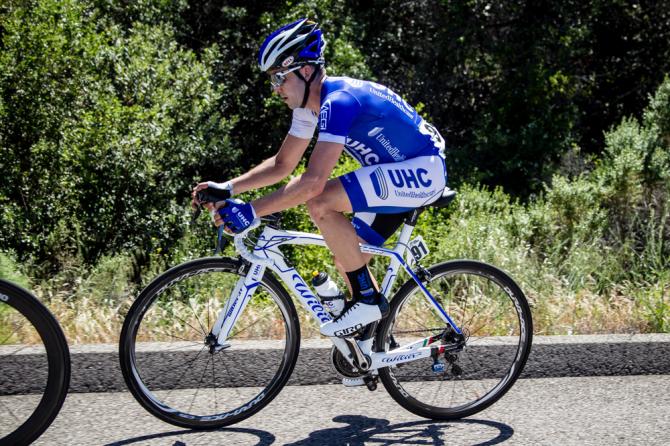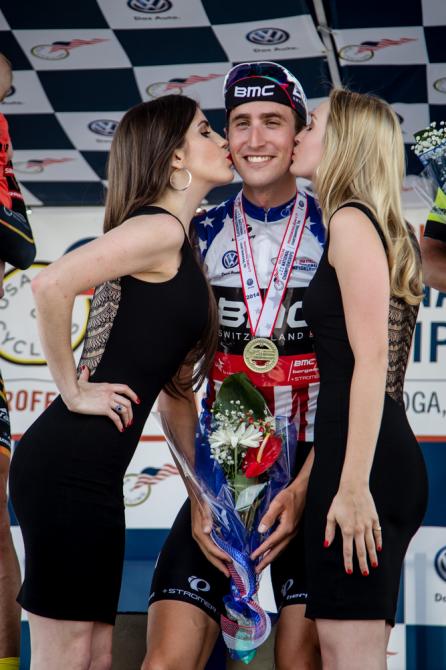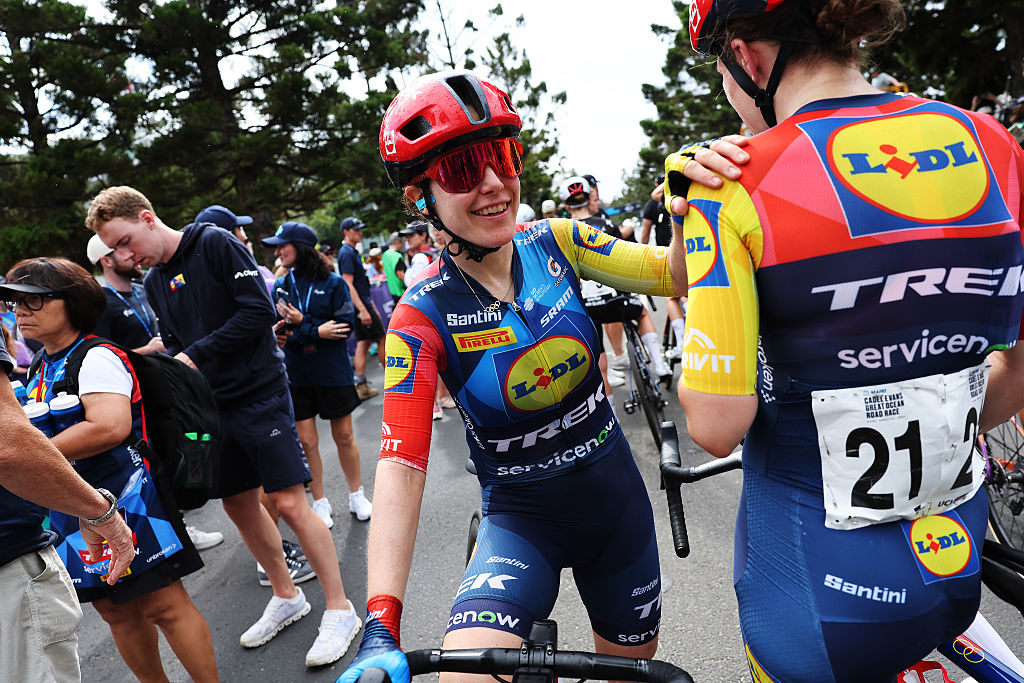Euser confirms race motorcycle caused crash with Phinney
UnitedHealthcare rider stresses need for safety in races
The latest race content, interviews, features, reviews and expert buying guides, direct to your inbox!
You are now subscribed
Your newsletter sign-up was successful


Although the USA Cycling Professional Road Championships were flying past at more than 70 kph, Lucas Euser's world had slowed to an almost slide-show pace. He and his good friend Taylor Phinney had just crashed while descending a section of the road race course Monday in Chattanooga, Tennessee, and it was obvious that Phinney had been seriously injured. Euser immediately snapped back into the moment.
"All of the sudden I did that body check of, 'Oh my God, I'm OK,'" Euser told Cyclingnews Tuesday after returning home to Boulder, Colorado. "And he was screaming like I've never heard anyone scream before. I could see the extent of the injuries rather gruesomely, and I knew he needed somebody to be there for a second."
Phinney (BMC Racing) had been leading Euser (UnitedHealthcare) on a swooping descent after the first climb up Lookout Mountain about 43 km into the 165.5 km race. As the duo set up for an off-camber, left-hand turn that came back on itself in an ungainly fashion, an official on a motorcycle appeared in front of them and then moved across the road, possibly trying create a clean line for the fast-approaching riders. But it was too late.
"I remember it just coming way too quick," said the 30-year-old Euser, who regularly trains with fellow Boulder resident Phinney.
"The last thing I remember seeing was the moto swerving back left-to-right, and then Taylor having to go inside on the corner, and then crashing," Euser said. "I recognized there was no way I could get through the corner with everything that was going on. I had to scrub as much speed as I could and then try to minimize my damage."
Euser took an outside line and laid his bike down before smashing into an approaching wall. When the dust settled, Euser's bike was severely damaged, but he was relatively unscathed.
"It exploded my rear wheel and my pedal and my seat and everything," Euser said. "Then I just kind of happened to pop back against the wall. I'm not really even sure that I ever crashed, or that I ever hit the ground. I don't know if I was on the ground and got back up and ran to Taylor, but it was the first instinct once I knew I was OK, was just to get to Taylor."
The latest race content, interviews, features, reviews and expert buying guides, direct to your inbox!
Phinney's inside trajectory had propelled him underneath a guard rail on the opposite side of the road. His left leg slammed into a support post, fracturing the lower limb in two places. The 23-year-old, who had just won his second US pro time trial title two days before, was bleeding and in severe pain. After his own initial shock wore off, Euser jumped into action to help his friend.
"I was just trying to get him to not move, trying to get the spectators to slow the other riders down, trying to get somebody to radio for a medic to get them there as soon as possible, and trying to get some cars to pull over, all while trying to make him lay still, because he kept trying to get out from underneath the barrier," Euser recalled.
Medics were on the scene quickly, Euser said, but with his UnitedHealthcare team car following a rider in the breakaway and neutral support long gone, his own race was over. He waited until Phinney was on a stretcher and being loaded into an ambulance before searching for his own bike and a replacement wheel. The ambulance eventually passed Euser as he rode down the descent. That's when he finally broke down thinking about everything that had just happened.
"At first [Phinney] was in a pretty bad place, and then I think the shock starts to settle in," Euser said. "I know the feeling where you don't even know where you are, and at that point you are so vulnerable you have to just trust the people around you. I think we all know that, and we all know how scary that situation is. There was a moment, I remember reaching out and grabbing his hand, and him saying 'Thank you.' Probably the most sincere thank you I've heard in a long time."
The weekend in Chattanooga started on a high note for Phinney, who took the time trial victory by nearly a minute over defending champion Tom Zirbel (Optum Pro Cycling). Phinney was heavily favored for the time trial win, and during the post-race press conference he revealed that clothing sponsor Pearl Izumi had made him a stars-and-stripes skinsuit before the race; it was waiting for him back at his hotel room. He planned to debut the new national champion's kit at the Critérium du Dauphiné next month and was aiming to be a part of BMC's squad for his first Tour de France in July.
But those plans are very likely now on hold. Phinney underwent surgery Monday night at a Chattanooga hospital for injuries that included a compound tibia-fibula fracture and an injury to the same knee. His team has not updated his prognosis since an initial announcement Monday evening.
The typical recovery time for a tibia-fibula fracture can range anywhere from six weeks to six months, depending on the condition of the break. Surgical repairs with rods and pins can often speed the recovery time and facilitate rehabilitation, but if there was shattering, or if the bones were displaced, all bets are off. Phinney could be out for at least the rest of the season.
"It's always been a very dangerous sport," Euser said, reflecting on the crash and its outcome. "But we sign up for that risk. We sign up for it when we go out there. And I think we trust that everything is going to be taken care of. But there are so many variables, sometimes things are out of everybody's control."
Monday's crash was the result of a "perfect storm" of bad things happening at just the wrong time, Euser said. But he's also started to notice more crashes in the peloton – bigger crashes, more severe crashes, and a lot of things that "seem like they shouldn't be happening, but they are." [Larry Warbasse, Phinney's BMC teammate, had been scheduled to race in Chattanooga but was scratched after crashing in the Tour of California's final stage, reportedly going over a guard rail on a descent.]
Still slightly shaken from Monday's events, Euser said he believes cycling needs to take a look at itself and reevaluate some priorities.
"We need to not resemble a battlefield," he said. "We need to remember that we're a legitimate sport, and at the very core of it we're all human beings. As much as we want to push ourselves and triumph over everything and win races, it's just a bike race."
Tuesday's stage of the Giro d'Italia, where the peloton raced up and down two mountain passes in a snowstorm and sub-freezing weather, is a perfect example of pushing things too far, he said.
"It's a matter of getting everybody on the same page, getting the safety of the riders, the benefit of the promoters, the benefit of the UCI and the teams, just get everybody on the same page," Euser said. "There needs to be an open dialogue about this. It just seems like there is so much disconnect between all the different facets of how a bike race comes together that we've lost focus on what it really is, which is just a bike race. It's entertainment."
There doesn't appear to be much that can stop or even slow down a bike race, so people take notice when when a rider like Euser forgets his own race to help a friend in need. But the seven-year pro shakes off any praise and says it's about being human beings and friends first, racers after that. Euser also said he and the rest of Boulder's cycling community will continue to stand by Phinney as he makes his way back.
"We're going to have a lot of time together in Boulder this summer," he said. "I'm not racing again until the Tour of Utah, so I'll be right there any time he needs me. I think everyone is right there to help him. That's what we're here for. At this point it's just being a good friend.
"It's not going to be easy," Euser said of Phinney's recovery. "But if there's any family I know who can tough it out and come back stronger than ever, it's those guys.”"
Growing up in Missoula, Montana, Pat competed in his first bike race in 1985 at Flathead Lake. He studied English and journalism at the University of Oregon and has covered North American cycling extensively since 2009, as well as racing and teams in Europe and South America. Pat currently lives in the US outside of Portland, Oregon, with his imaginary dog Rusty.
